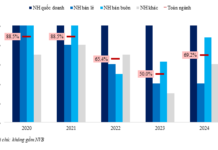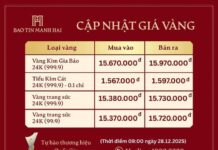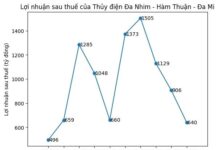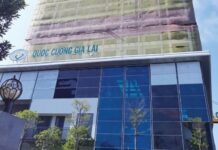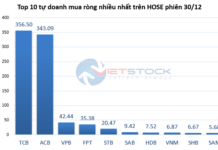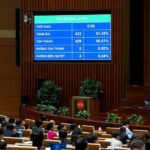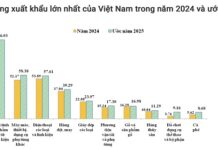The resolution clearly outlines the objectives, 15 key indicators, and 11 critical tasks and solutions, closely aligned with the draft documents of the 14th Party Congress and the conclusions of the 13th Central Committee Conference.
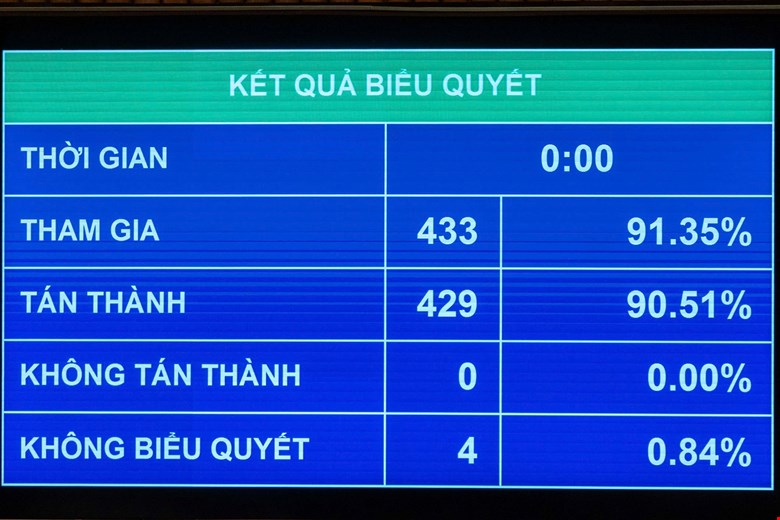
Voting results for the resolution on the 2026 socio-economic development plan. Photo: National Assembly
Targeting 10% GDP Growth in 2026
To promote economic growth alongside macroeconomic stability, the government will continue to coordinate and implement macroeconomic policies effectively across sectors to achieve the 2026 growth targets.
Specifically, GDP growth is aimed at 10% or higher, while maintaining macroeconomic stability, controlling inflation, and ensuring the economy’s major balances. The average GDP per capita is projected to reach USD 5,400–5,500; the manufacturing sector’s share of GDP is expected to be around 24.96%; and the average consumer price index (CPI) growth rate is anticipated to be approximately 4.5%.
This includes the continued implementation of an expanded fiscal policy with clear priorities, enhanced revenue management to ensure timely and accurate collection. Leveraging state budget resources alongside social capital will drive strategic breakthroughs and key resolutions of the Politburo.
Monetary policy will be conducted proactively, flexibly, and efficiently, with interest rates and exchange rates managed appropriately to ensure affordable capital access. Credit will be directed toward production, business, and priority sectors. Strict management of the gold and real estate markets will be maintained. The domestic market will be strengthened, tourism promoted, export markets diversified, and free trade agreements (FTAs) effectively utilized to tap into potential export markets.
In the development of culture, society, education, and training, the government will focus on enhancing human resource quality, ensuring holistic and synchronized progress across sectors. This will be done in harmony with economic growth, environmental protection, and social welfare, prioritizing improved living standards for the population.
Accordingly, the government proposes higher cultural and social targets for 2026 compared to 2025, with a gradual increase over the years. The average labor productivity growth rate for 2026 is expected to be around 8.5% (a 1.8% increase from 2025).
The proportion of workers with degrees or certificates is expected to reach approximately 29.5% (a 0.3% increase from 2025). The number of doctors, hospital beds, and the population covered by health insurance in 2026 is projected to increase by 0.2% to 0.3% compared to 2025.
Moving forward, the government and the Prime Minister will focus on directing ministries, agencies, and localities to effectively and decisively implement the tasks and solutions outlined in the National Assembly’s resolution, as well as Resolutions 71 and 72 of the Politburo on breakthroughs in education, training, and healthcare.
Continued implementation of social welfare policies, policies for veterans, ethnic groups, religions, beliefs, population, the elderly, children, youth, women, and more will be ensured. A harmonious balance between economic development and environmental protection will be maintained, alongside the pursuit of sustainable development goals.
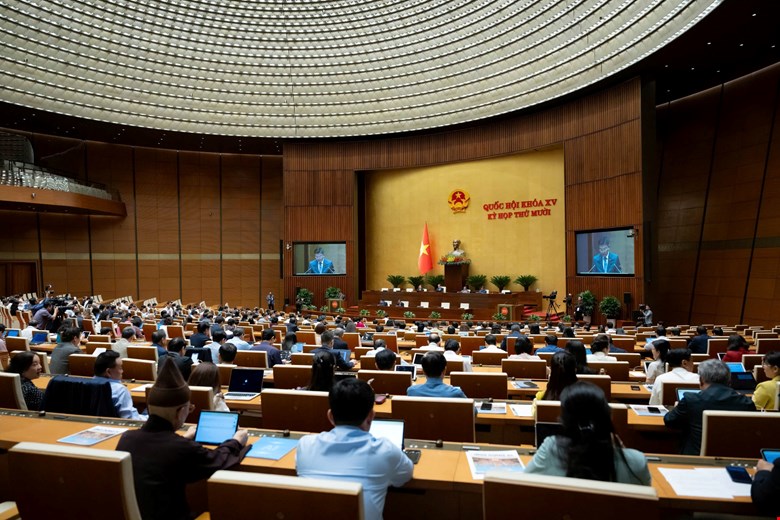
Session in progress. Photo: National Assembly
49 Laws and Resolutions to Be Submitted to the National Assembly
To build and refine institutional frameworks for immediate implementation in 2026, the government and the Prime Minister are intensively directing legal development and enforcement, with a focus on innovative legal drafting. At the 10th session, 49 laws and resolutions are expected to be submitted to the National Assembly to remove bottlenecks, unlock resources, and meet the demands of the new era.
The government will continue to direct ministries, sectors, and localities to comprehensively refine institutions and laws, focusing on investment, business, administrative procedure reforms, and simplifying business conditions. This aims to create a transparent legal environment, reduce compliance costs for citizens and businesses, and enhance national competitiveness.
Limitations, inconsistencies, and legal obstacles will be reviewed for amendments to ensure synchronization, practicality, and feasibility. Regulations on decentralization, authority delegation, and resource allocation for ministries, sectors, and localities will be refined.
Deputy Prime Minister Lê Thành Long affirmed that the government will seriously consider feedback from National Assembly delegates and citizens nationwide to effectively implement the National Assembly’s resolution on the 2026 socio-economic development plan. This will lay the foundation for the 2026–2030 socio-economic development plan, propelling the nation into a new era of prosperity, civilization, and happiness.
The government has directed the Ministry of Finance to collaborate closely with relevant ministries, agencies, and localities to urgently draft Resolution No. 01 of 2026, ensuring clear guidance, progress monitoring, and evaluation of the 2026 socio-economic development goals and tasks.
Vietnam: Asia’s Rising Star
Over the past five years, Vietnam’s economy has demonstrated remarkable resilience in the face of global shocks, consistently maintaining one of the highest growth rates in the world.
Vietnam’s National Assembly Sets Ambitious 10%+ Economic Growth Target for 2026
On November 13th, with an overwhelming majority of 429 out of 433 votes in favor, the National Assembly adopted a resolution outlining the socio-economic development plan for 2026. This ambitious plan sets a target growth rate of 10% or higher, marking a significant stride towards economic advancement.
Exciting News: Rice Exports, Accounting Services, and 23 Other Industries Proposed by the Government to Operate Without Business Licenses
The government has submitted a draft amendment to the Investment Law to the National Assembly, proposing the elimination of conditional business requirements for 25 sectors, including accounting services and rice exports. This move aims to significantly shift from ex-ante to ex-post inspection, fostering greater business freedom and streamlining regulatory processes.
Revamped Investment Law: Streamlining Business Procedures with Proposed Cuts and Simplifications
The revised Investment Law has been meticulously crafted to institutionalize the resolutions of the Party, effectively addressing institutional and legal bottlenecks. By streamlining and simplifying investment and business procedures, it empowers both citizens and enterprises, fostering a more conducive environment for growth and development.






